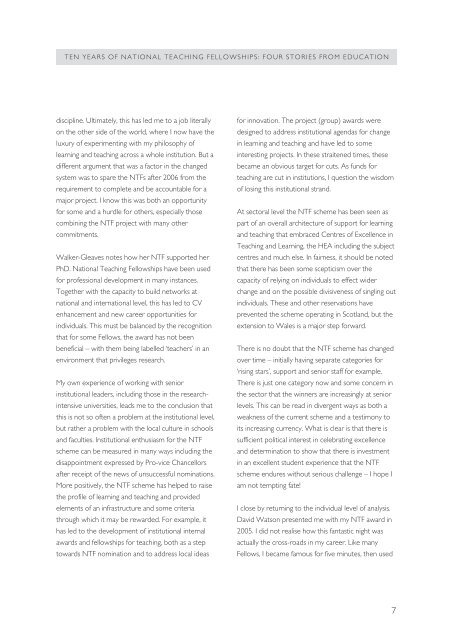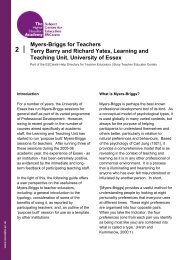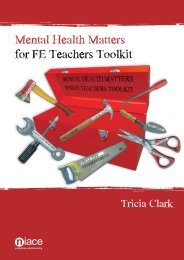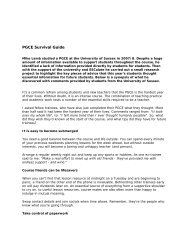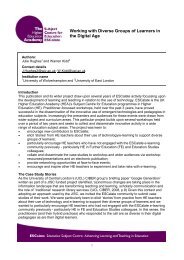pdf 4.2MB - ESCalate
pdf 4.2MB - ESCalate
pdf 4.2MB - ESCalate
Create successful ePaper yourself
Turn your PDF publications into a flip-book with our unique Google optimized e-Paper software.
TEN YEARS OF NATIONAL TEACHING FELLOWSHIPS: FOUR STORIES FROM EDUCATIONdiscipline. Ultimately, this has led me to a job literallyon the other side of the world, where I now have theluxury of experimenting with my philosophy oflearning and teaching across a whole institution. But adifferent argument that was a factor in the changedsystem was to spare the NTFs after 2006 from therequirement to complete and be accountable for amajor project. I know this was both an opportunityfor some and a hurdle for others, especially thosecombining the NTF project with many othercommitments.Walker-Gleaves notes how her NTF supported herPhD. National Teaching Fellowships have been usedfor professional development in many instances.Together with the capacity to build networks atnational and international level, this has led to CVenhancement and new career opportunities forindividuals. This must be balanced by the recognitionthat for some Fellows, the award has not beenbeneficial – with them being labelled ‘teachers’ in anenvironment that privileges research.My own experience of working with seniorinstitutional leaders, including those in the researchintensiveuniversities, leads me to the conclusion thatthis is not so often a problem at the institutional level,but rather a problem with the local culture in schoolsand faculties. Institutional enthusiasm for the NTFscheme can be measured in many ways including thedisappointment expressed by Pro-vice Chancellorsafter receipt of the news of unsuccessful nominations.More positively, the NTF scheme has helped to raisethe profile of learning and teaching and providedelements of an infrastructure and some criteriathrough which it may be rewarded. For example, ithas led to the development of institutional internalawards and fellowships for teaching, both as a steptowards NTF nomination and to address local ideasfor innovation. The project (group) awards weredesigned to address institutional agendas for changein learning and teaching and have led to someinteresting projects. In these straitened times, thesebecame an obvious target for cuts. As funds forteaching are cut in institutions, I question the wisdomof losing this institutional strand.At sectoral level the NTF scheme has been seen aspart of an overall architecture of support for learningand teaching that embraced Centres of Excellence inTeaching and Learning, the HEA including the subjectcentres and much else. In fairness, it should be notedthat there has been some scepticism over thecapacity of relying on individuals to effect widerchange and on the possible divisiveness of singling outindividuals. These and other reservations haveprevented the scheme operating in Scotland, but theextension to Wales is a major step forward.There is no doubt that the NTF scheme has changedover time – initially having separate categories for‘rising stars’, support and senior staff for example.There is just one category now and some concern inthe sector that the winners are increasingly at seniorlevels. This can be read in divergent ways as both aweakness of the current scheme and a testimony toits increasing currency. What is clear is that there issufficient political interest in celebrating excellenceand determination to show that there is investmentin an excellent student experience that the NTFscheme endures without serious challenge – I hope Iam not tempting fate!I close by returning to the individual level of analysis.David Watson presented me with my NTF award in2005. I did not realise how this fantastic night wasactually the cross-roads in my career. Like manyFellows, I became famous for five minutes, then used7


